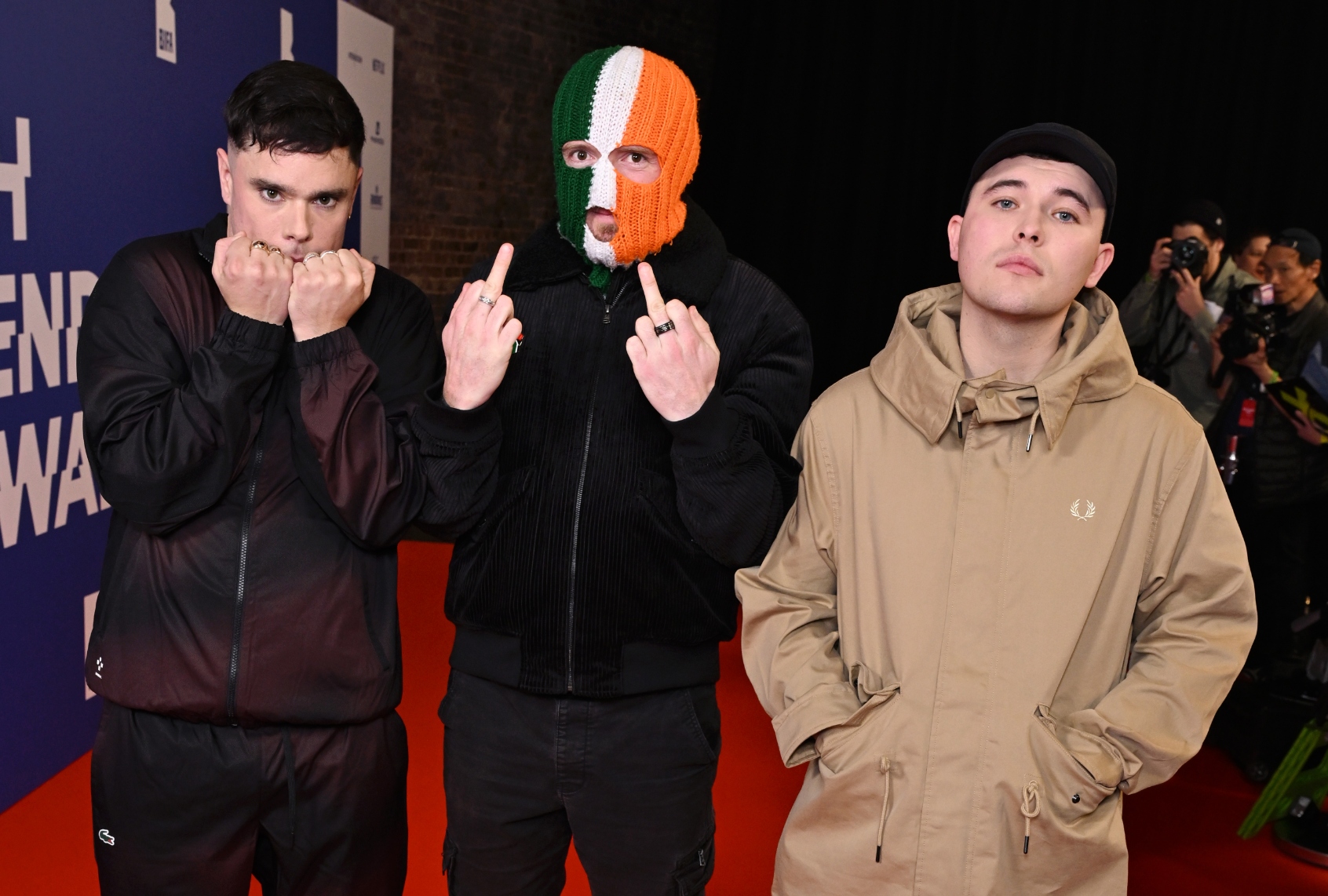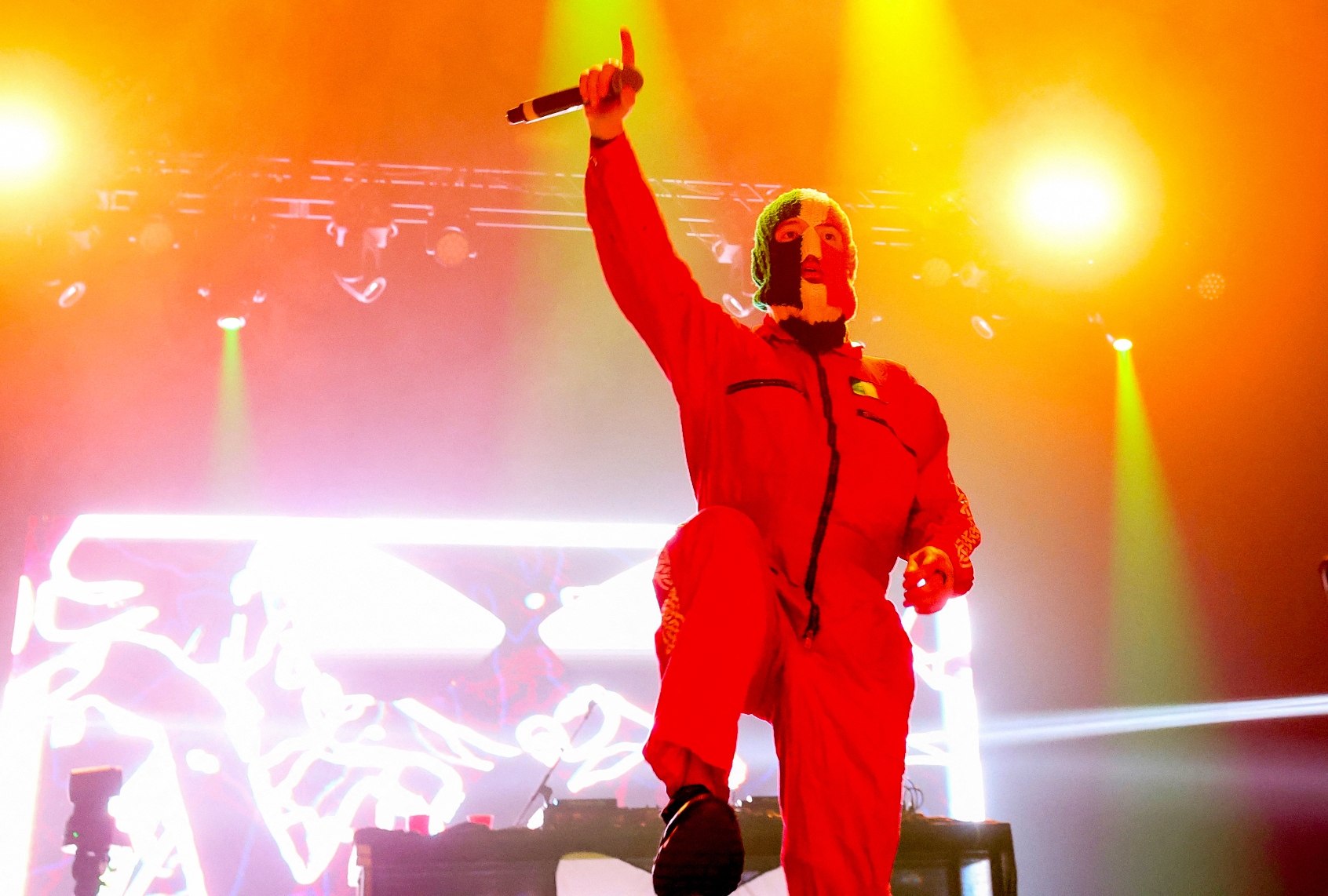It’s almost surprising that a hip-hop band from the perennially troubled, still-British province of Northern Ireland hasn’t emerged until now: It’s the right kind of place. Admittedly, “race,” in the 21st-century meaning of the word, is not a major consideration on the island of Ireland, despite some discomfort with recent immigration from Eastern Europe, Syria, North Africa and elsewhere. Belfast and Dublin still don’t possess the kind of high-friction cultural ferment found in London, Paris or Berlin, and Ireland’s best-known musical exports can clearly be classified along the spectrum that includes rock, pop, folk and punk: Van Morrison, U2, Sinéad O’Connor, the Pogues.
Indeed, if there’s a track that defines pop music in Northern Ireland before the rise of the Irish-language hip-hop trio Kneecap — now the focus of international controversy and incoherent Fox News attacks after their Coachella performance on April 18 — it would be the exquisite punk-pop single “Teenage Kicks” by the Undertones, released in 1978 during the worst years of the vicious low-intensity civil conflict known as the Troubles.
There’s an instructive parallel at work here that strikes me as distinctively Irish. A punk band from Derry — a city where violent riots occurred nearly every night, and whose residents couldn’t even agree on its name (to Protestants and the British government, it was and is Londonderry) — crafted a completely out-of-context pop record that carried the influence of the Ramones and the Beach Boys but zero hint of social conflict or cultural trauma. That could be construed as willful escapism or youthful irresponsibility; it strikes me as more like storytelling, an area where the Irish are known to excel.
Kneecap might appear, at first, to be the exact opposite: A hip-hop trio from predominantly Catholic communities in Belfast and Derry, all born during the latter stages of the Troubles (which gradually petered out between 1998 and 2004), the band embraced a highly performative brand of radical politics from the get-go: anti-British, sure, but also anti-cop, anti-Israel, anti-old-school Irish nationalism and anti-authority figure, just for starters. All of which is abundantly captured in their highly entertaining mock-biopic (available on Netflix), which was Oscar-shortlisted in 2024 and built a global audience for Kneecap well before their recent tours of the U.S., U.K. and Australia.
You don’t need to claim that Kneecap’s politics are insincere to understand that they constitute just one element of a brand that includes highly conventional hip-hop braggadocio about sex, drug use and other forms of extralegal activity, along with what made the band stand out in the first place: a Google Translate-defeating mixture of imported rap argot, Belfast Hiberno-English and the Irish language. The title of their 2018 debut album, "3CAG," requires a decoder ring: That stands for "trí chonsan agus guta" or "three consonants and a vowel," a reference to the street drug MDMA, whose consumption Kneecap's members have frequently celebrated. One of their biggest hits in Ireland, "Get Your Brits Out," combines IRA-style political slogans with a refrain meant to encourage young women in the audience to, um … I think you get it.
For decades, the Irish-language revival was associated with obligatory schoolbook lessons, traditional folk culture and a dreary version of nationalism. Kneecap represent the leading edge of a trend: Speaking Irish is cool again.
I could devote this whole article to unpacking the tangled politics around the Irish language, but you wouldn’t read it, so this will have to do: Since virtually no one in Ireland, north or south, now exclusively speaks Irish as a daily language, fluency has become a distinctive cultural and political signifier. For decades, the language revival was associated with obligatory schoolbook lessons, traditional folk culture and an increasingly dreary version of nationalism; Kneecap’s rise can be understood as the leading edge of a general pop-culture trend: Speaking Irish is cool again.
We need your help to stay independent
In the uneasy and remarkably small-minded politics of Northern Ireland — which remains about evenly divided between Catholics who identify as Irish and Protestants who identify as British — the Irish language is still perceived as a political provocation. That's exactly why Kneecap’s two principal rappers, who go by the in-joke names Mo Chara and Móglai Bap, grew up in Irish-speaking families. But it was the band’s more overt political discourse that has gotten them in trouble — if you actually believe that making headlines around the world amounts to trouble for a deliberately confrontational rap act.
 Móglai Bap, DJ Provaí and Mo Chara of Irish hip-hop group Kneecap attend the 27th British Independent Film Awards, Dec. 8, 2024 in London. (Jeff Spicer/Getty Images)Toward the end of Kneecap’s second Coachella performance last month, which by all accounts was packed and enthusiastically received, the band projected a series of three slides on a screen above the stage. Here’s the BBC report:
Móglai Bap, DJ Provaí and Mo Chara of Irish hip-hop group Kneecap attend the 27th British Independent Film Awards, Dec. 8, 2024 in London. (Jeff Spicer/Getty Images)Toward the end of Kneecap’s second Coachella performance last month, which by all accounts was packed and enthusiastically received, the band projected a series of three slides on a screen above the stage. Here’s the BBC report:
The first message said: "Israel is committing genocide against the Palestinian people," followed by: "It is being enabled by the US government who arm and fund Israel despite their war crimes," and a final screen added: "[Expletive] Israel. Free Palestine."
Lead rapper Mo Chara (a conventional greeting that literally means “my friend”), then told the crowd, "The Irish not so long ago were persecuted at the hands of the Brits, but we were never bombed from the f**king skies with nowhere to go. The Palestinians have nowhere to go."
That might not be the most historically nuanced or deeply considered comparison of the two conflicts, but I can't say I detect any lies. Kneecap were already known villains to the right-wing British media and politicians like embattled Conservative Party leader Kemi Badenoch, so you might have expected the MAGA-fied American right to be ready. You would be wrong: The ensuing storm of manufactured outrage was comically inept, with Sharon Osbourne, for some reason, stepping forward as the alleged voice of pop-culture responsibility (or something?) to urge that Kneecap’s U.S. visas be revoked.
If it's impossible to tell where the radical politics end and the bad-boy shtick begins with Kneecap, I would say that's pretty much the point — and not exactly a new phenomenon in pop culture.
That was followed by a bewildering Fox News segment about the Coachella “F**k Israel” incident, in which former NCAA swimmer turned right-wing influencer Riley Gaines, while admitting she’d never heard of the band, appeared to conflate three Irish rappers with “rogue activist judges” and concluded, “No, this didn't happen in Nazi Germany in the 1930s. This was in 2025 in America. Beyond, beyond staggering.”
I doubt many people would find it “beyond staggering” for a hip-hop band from an odd, hyperlocal background that wants to attract a global left-leaning youth-culture audience to say bad things about Israel. You could argue, in fact, that it’s a bit lazy and not especially well thought-out, or that the members of Kneecap are cashing in on what has been called Irish privilege, where you get to be regular white people in some contexts (such as American society in general) and part of the world’s oppressed classes in others. That privilege is no doubt why Kneecap's members were admitted to the U.S. in the first place; if anyone at Kristi Noem's DHS had bothered to check out their backgrounds, they might be in ICE detention right now.
Want a daily wrap-up of all the news and commentary Salon has to offer? Subscribe to our morning newsletter, Crash Course.
That double standard is no doubt at work here, but so is the double standard among Kneecap’s critics on both sides of the Atlantic, dutifully playing their roles as finger-wagging scolds lamenting the moral collapse of Today’s Youth. Of course it’s offensive that Kneecap members apparently chanted “Up Hamas, up Hezbollah” at a concert last November, or that they suggested a year earlier that right-wing members of the British Parliament deserved to die. It’s supposed to be offensive. This band was equally shaped by “F**k tha Police”-era gangsta rap and early Beastie Boys; they named themselves for the IRA’s notoriously gruesome punishment tactic: a shotgun blast to the back of the knee. (As for their chant of “Maggie’s in a box” in tribute to Margaret Thatcher, a political leader none of them is old enough to remember — I’m sorry, that’s hilarious.)
If it’s impossible to tell where the radical politics end and the bad-boy shtick begins with Kneecap, I would say that’s pretty much the point, and gently insist that's not exactly a new phenomenon in pop culture, or in culture, period. Elvis Presley once described “Hound Dog” as a protest song, which leads one to conclude he wasn’t half as dumb as he sometimes appeared.
To circle all the way back to the Undertones and “Teenage Kicks,” if that miraculous pop anthem was a fantasy narrative constructed to escape from the grim reality of Northern Ireland in the late ‘70s, what Kneecap are doing is categorically similar. Yeah, the context has shifted immensely, so much so that Kneecap can use the iconography and sloganeering of the Irish Troubles as ironic or melodramatic background effects. (That would have literally gotten you kneecapped in the ‘70s.) But the essential Irish paradox is unchanged: We remain true to this claustrophobic little place, and also we want out.
Read more
from Andrew O'Hehir on our bewildering world


